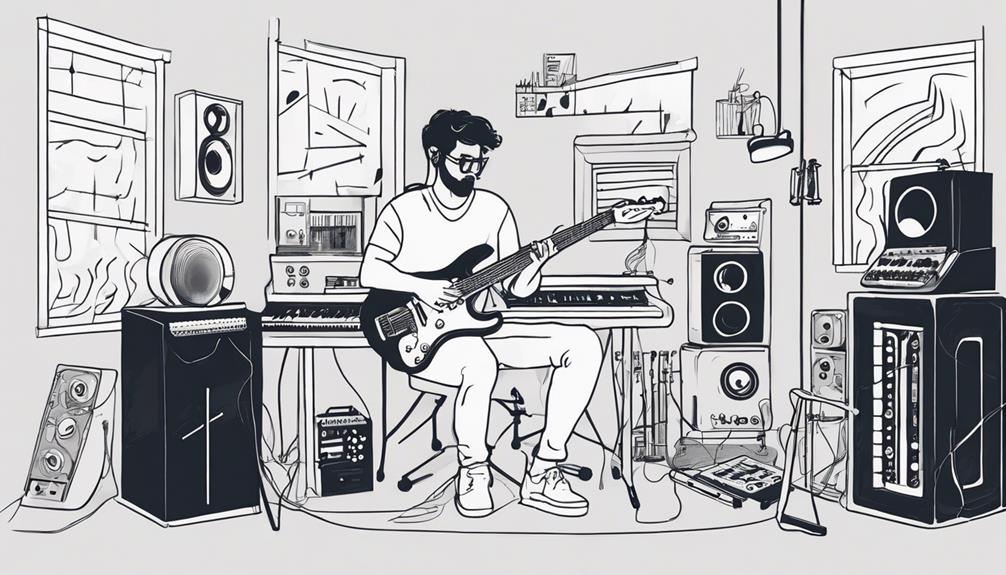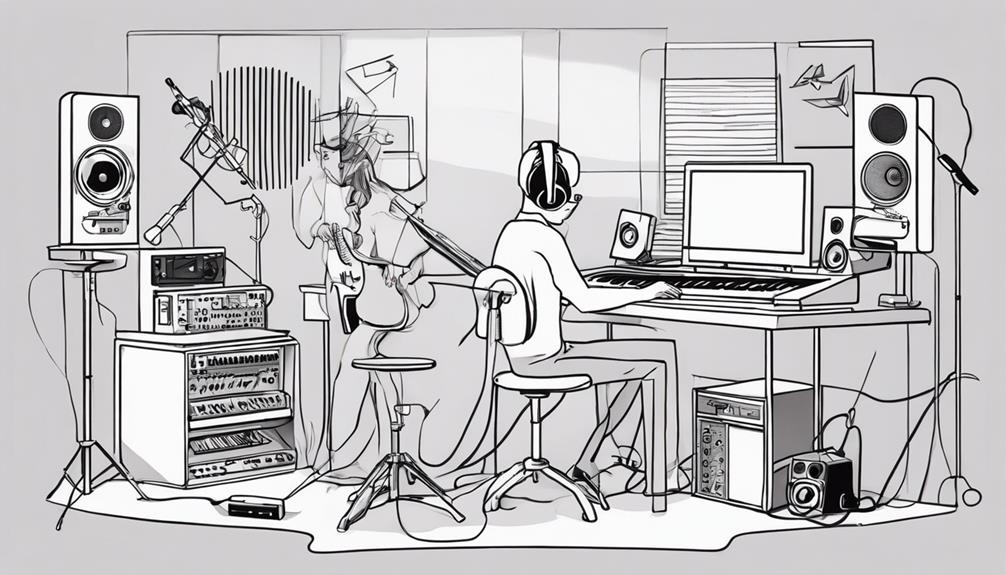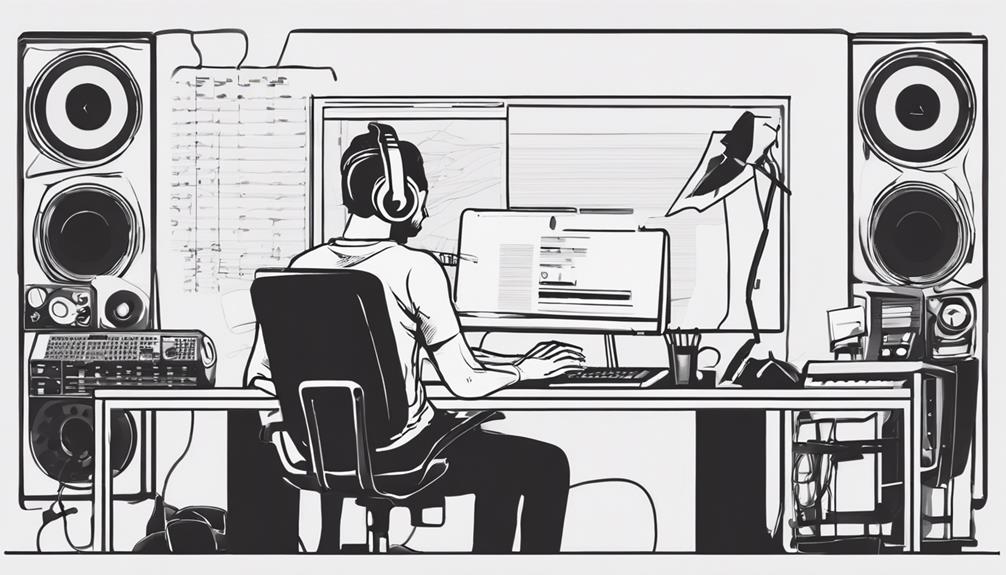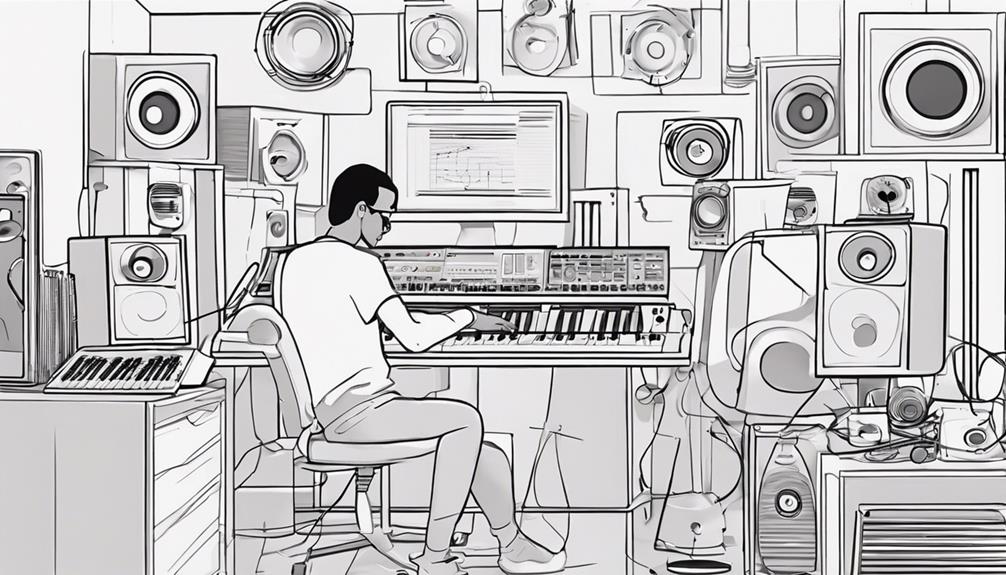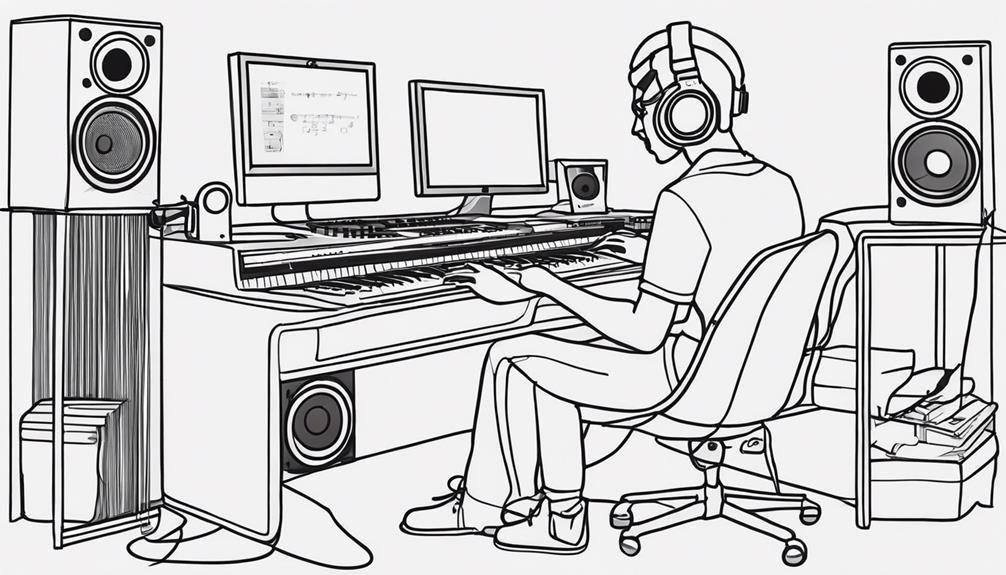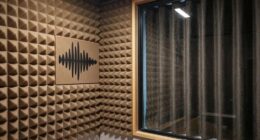Explore your creative potential in music production by embracing diverse musical influences, experimenting with innovative sounds, and collaborating with fellow artists. Immerse yourself in various genres, mix instruments, and utilize technology efficiently. Develop unique techniques and seek feedback for growth. Stay motivated by attending events and exploring new methods. Think outside the box, and discover your distinctive sound! Push the boundaries of your creativity by staying curious and always learning new music production tips and techniques. Whether it’s mastering advanced software, delving into sound design, or studying the work of your favorite producers, continuous growth will refine your craft. Remember, innovation often arises from blending established methods with bold, fresh ideas!
Key Takeaways
- Experiment with diverse genres for inspiration and creativity.
- Collaborate with musicians from different backgrounds.
- Utilize technology for innovative sound creation.
- Embrace unconventional instruments and sounds.
- Seek feedback and mentorship for growth and improvement.
Embrace Musical Diversity
To enhance your creative music production skills, embrace musical diversity by exploring a wide range of genres. Explore various music genres, from classical to electronic, to expand your creative palette.
Attend live shows and music festivals to immerse yourself in diverse sounds and styles, drawing inspiration from the unique elements each genre offers.
Collaborate with musicians from different backgrounds and genres to blend their distinctive flair into your productions. Incorporate unconventional instruments and sounds to add depth and creativity to your music, making it remarkable.
Experiment With Sound
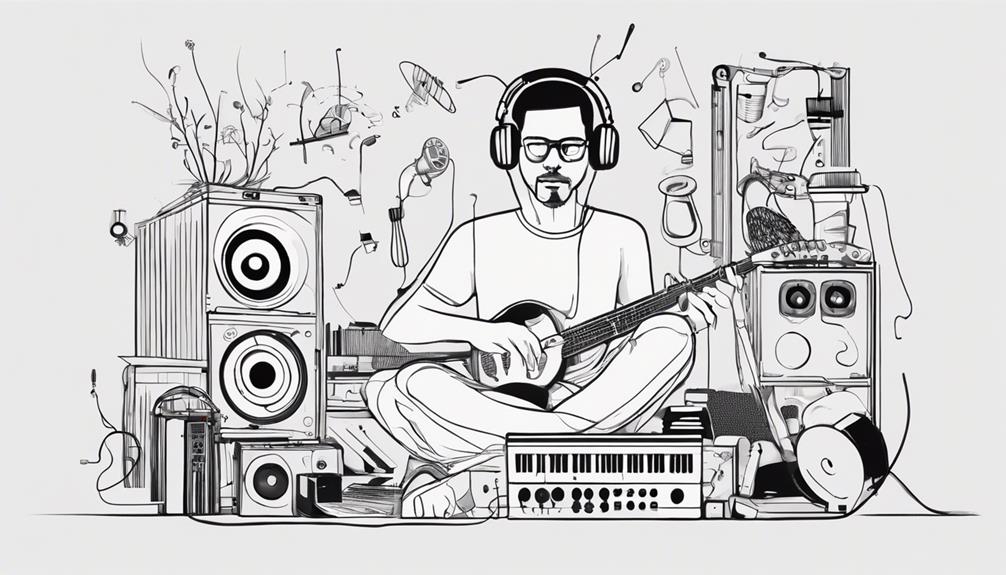
Try mixing and matching different instruments, samples, and effects to craft fresh and innovative sounds for your music.
Experiment with synthesizer settings, drum patterns, and audio manipulations to see where your creativity can take you.
Combine traditional and electronic elements to create dynamic compositions that stand out in the music scene.
Sound Layering Techniques
Experimenting with sound layering techniques allows you to discover depth and texture in your music production. By layering different elements like percussion, vocals, and synths, you can build a rich sonic landscape.
Incorporating effects such as reverb, delay, and automation can enhance the individual characteristics of each layer, adding dimension to your tracks. Adjusting parameters like volume, panning, and EQ helps blend the sounds seamlessly, ensuring a balanced mix.
To elevate your compositions, consider combining contrasting sounds or harmonies within your layers for added complexity and intrigue. Exploring automation techniques can introduce dynamic changes over time, injecting movement and interest into your layered sounds.
Experiment with these techniques to reveal new creative possibilities and take your music production to the next level.
Unique Sound Effects
Discovering new sonic dimensions involves experimenting with unique sound effects to infuse your music with distinctive textures and atmospheres. To tap into your creative potential in music production, consider the following techniques:
- Utilize synthesizers, samplers, and virtual instruments: Immerse yourself in a world of endless possibilities by exploring the sonic capabilities of digital and virtual tools.
- Incorporate foley sounds and field recordings: Add a touch of authenticity and uniqueness to your music by including everyday sounds and recordings from the world around you.
- Explore granular synthesis and modulation effects: Delve into advanced sound design techniques to sculpt intricate textures and dynamic soundscapes that captivate your listeners.
- Combine traditional instruments with electronic effects: Blend the organic warmth of acoustic instruments with the futuristic sounds of electronic effects to create a hybrid sound palette that sets your music apart from the rest.
Collaborate for Inspiration
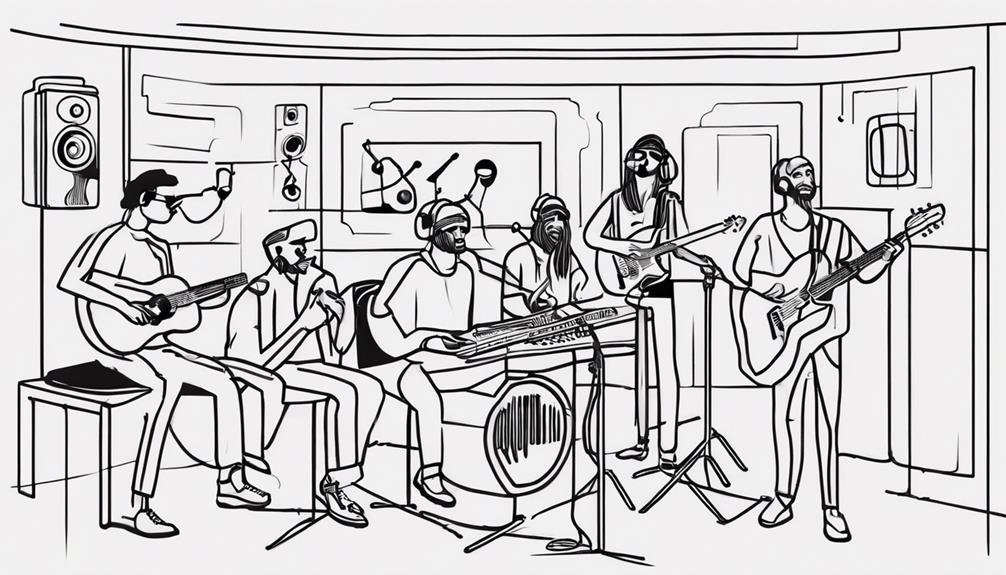
Engaging in collaborations with other musicians can infuse your music production process with fresh inspiration and innovative ideas. By collaborating with different artists, you can benefit from their diverse talents and gain fresh perspectives that spark creativity in your tracks.
Working together can lead to the creation of unique and innovative sounds that set your music apart. Through collaboration, you have the opportunity to learn from others' techniques and approaches, expanding your own creative skills in the process.
Networking with fellow musicians not only allows for joint projects but also opens doors to new opportunities and exposure to different audiences. Joining forces with a variety of talents can result in dynamic and engaging music productions that stand out in the industry.
Embrace collaboration as a means to enhance your creativity and take your music production to new heights.
Harness Technology Effectively
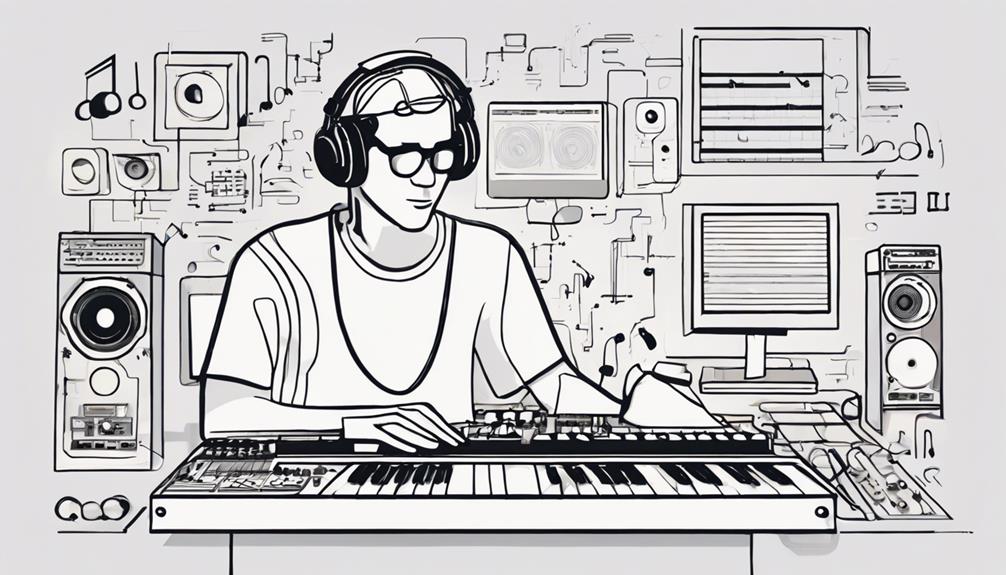
You can elevate your music production by leveraging digital audio workstations like Ableton Live, Logic Pro, or FL Studio.
Invest in essential tools such as audio interfaces, headphones, and microphones to enhance the quality of your productions.
Explore a variety of software plugins or VSTs to expand your sound creation capabilities and take your music to the next level.
Tech Tools for Creativity
To enhance your creative music production process, harness technology effectively with the right tools and software. When diving into music creation, consider the following tech tools for igniting your creativity:
- Digital Audio Workstations (DAWs):
Choose from industry-standard options like Ableton Live, Logic Pro, or FL Studio for composing, recording, editing, and mixing your tracks.
- Essential Hardware:
Invest in quality studio monitors, microphones, headphones, and audio interfaces to guarantee accurate sound reproduction and recording capabilities.
- VST Plugins:
Expand your sonic palette with VST plugins, enhancing your tracks with a variety of virtual instruments, effects, and processors.
- Cost-Effective Options:
Explore free VST plugins to experiment with different sounds without breaking the bank, allowing for innovative music production on a budget.
Digital Collaboration Benefits
Digital collaboration in music production greatly enhances the efficiency and scope of creative projects by enabling real-time interaction and file sharing among artists worldwide. Thanks to technology, remote collaboration has become essential, allowing musicians to share project files, stems, and ideas effortlessly.
Online platforms such as Splice, Soundtrap, and BandLab play a vital role in facilitating this global connectivity, enabling musicians to work together regardless of their physical location. Virtual collaboration tools offer additional features like live streaming, chat functionalities, and project management capabilities, further enhancing teamwork in music production.
Cultivate Creative Techniques
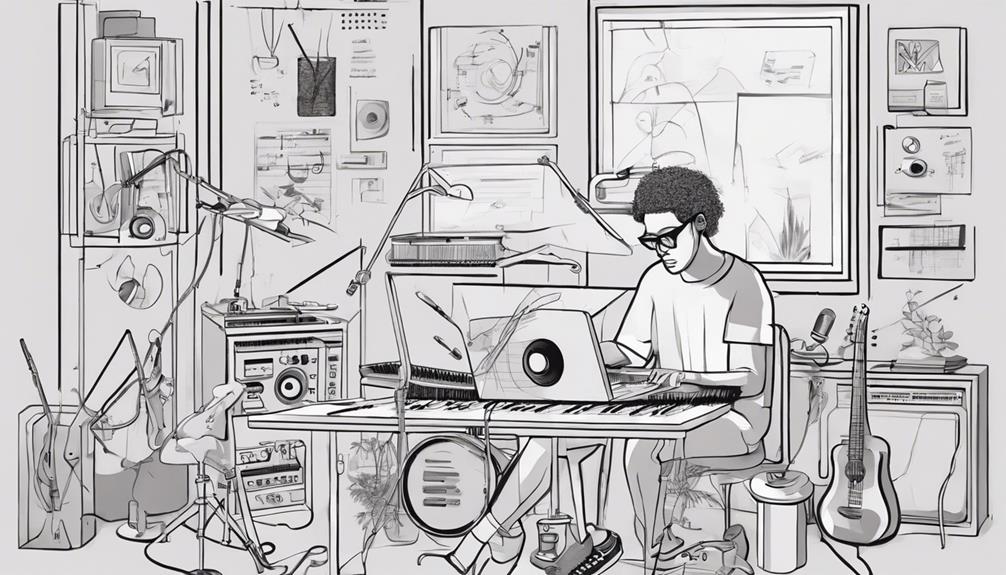
Explore various methods to enhance your creativity in music production, fostering your ability to craft unique and innovative sounds. To cultivate your creative techniques, consider the following:
- Experiment with different sound textures, harmonies, and effects: Mix and match various elements to create a signature style that sets you apart.
- Utilize synthesizers, drum machines, and digital audio workstations: These tools offer endless possibilities for sound manipulation and experimentation.
- Incorporate sampling techniques: Use samples creatively to add layers of depth and complexity to your tracks.
- Embrace creative risks and try new production methods: Push the boundaries of what you know and be open to exploring the unknown.
Keep an open mind and be willing to adopt new techniques to keep your music fresh and exciting. By embracing these strategies, you can tap into your full creative potential in music production.
Develop Your Unique Sound
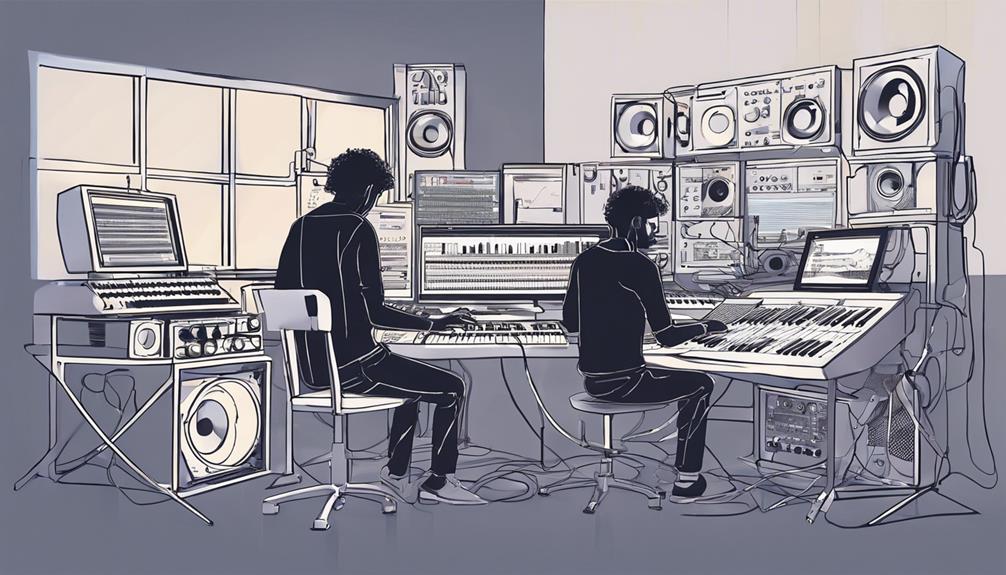
Cultivating your unique sound in music production involves experimenting with various sound textures, harmonies, and effects to craft a distinctive musical style that sets you apart.
To develop your own unique sound, you must be willing to experiment with different techniques, instruments, and genres. Incorporate unconventional methods and push boundaries to create a sound that resonates with your artistic vision.
Fearlessly explore new sonic territories, stepping outside your comfort zone to find your creative voice in music production. Embrace innovative ideas and unconventional approaches to music-making.
By consistently challenging yourself and trying new things, you'll discover new possibilities and refine your sound. Remember, the key to developing a unique sound lies in your willingness to explore, experiment, and evolve as a music producer.
Seek Feedback and Growth

Engage with experienced producers and mentors to solicit valuable feedback and foster your growth in music production. Constructive criticism is a powerful tool for improvement.
Here's how you can seek feedback and promote growth:
- Connect with experienced producers: Reach out to professionals in the industry to receive guidance and feedback on your work.
- Seek mentors: Establish relationships with mentors who can provide personalized advice and help you navigate the complexities of music production.
- Join online communities: Participate in forums or groups where you can share your music, engage with peers, and gather diverse perspectives.
- Attend workshops and courses: Take advantage of learning opportunities to expand your knowledge, refine your skills, and stay updated on industry trends.
Stay Motivated and Inspired

Immerse yourself in a diverse array of music genres and artists to fuel your inspiration and maintain motivation throughout your music production journey. By exploring different musical styles, you can stay motivated and inspired, drawing fresh ideas and perspectives into your own creations.
Attending live concerts, music festivals, and workshops is another effective way to connect with fellow musicians, sparking new ideas and approaches for your projects.
Experimenting with new production techniques, software tools, and hardware devices can help keep your creative spark alive. Don't hesitate to seek feedback and mentorship from experienced producers or engage with online communities to stay motivated and continuously improve your skills.
These interactions can provide valuable insights and encouragement to push your music production endeavors to new heights.
Remember to take breaks, practice self-care, and explore other art forms to recharge your creativity and sustain long-term motivation in music production. By staying engaged and open to new experiences, you can cultivate a thriving environment for your creative journey.
Frequently Asked Questions
How Do You Unlock Creative Potential?
To unleash creative potential, you need to explore various techniques, draw inspiration from diverse sources, collaborate with others, embrace mistakes, and utilize tools effectively. By doing so, you can expand your creativity and innovate in your music production endeavors.
How to Be More Creative as a Music Producer?
Enhance your creativity as a music producer by exploring new sounds, collaborating with fellow artists, and drawing inspiration from diverse sources. Embrace risks, experiment with software tools, and break away from the norm to innovate.
How Do You Unlock Creativity in Music?
To ignite creativity in music, you must push boundaries, experiment with new techniques and sounds, and draw inspiration from diverse sources. Embrace risks, stay curious, and infuse your unique style to break free and discover new ideas.
How Do You Unlock Artistic Creativity?
To harness artistic creativity, you must explore various music production techniques. Mix genres, draw inspiration from everyday life, collaborate with others, and use tools like digital workstations and effects. Embrace experimentation to find your unique sound.
Conclusion
To sum up, keep in mind that creativity in music production is crucial for standing out in a competitive industry.
Did you know that 71% of successful musicians attribute collaboration as a key factor in their creative process?
By embracing diversity, experimenting with sound, and staying motivated, you can unleash your full potential and create music that truly resonates with your audience.
Keep pushing boundaries and exploring new ideas to keep your creativity flowing!

